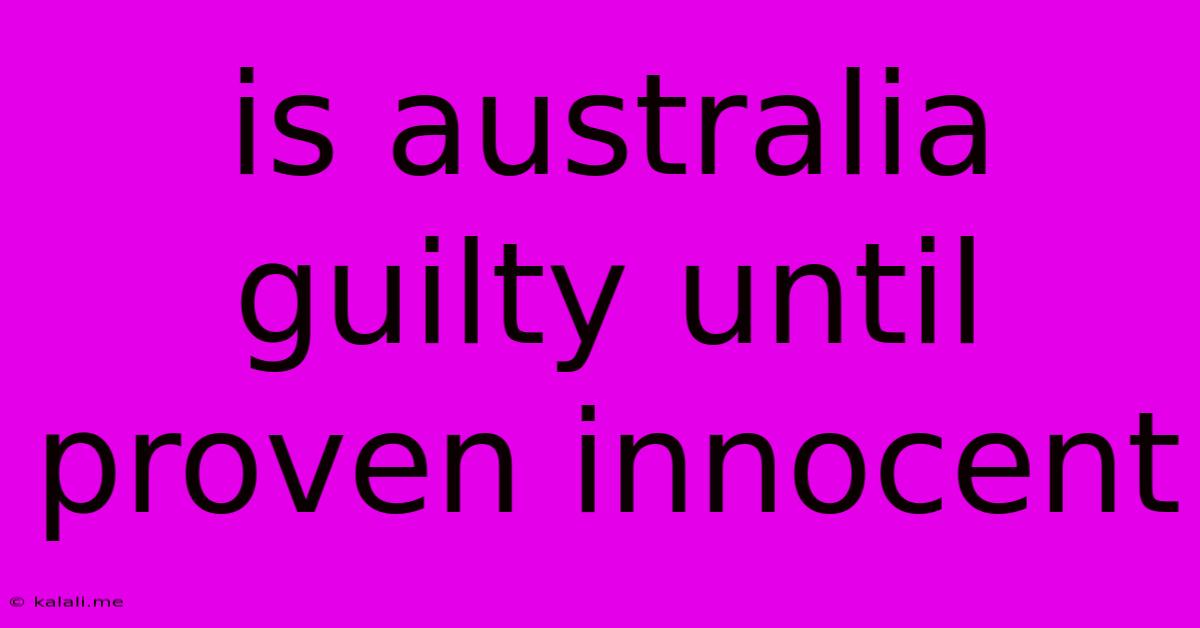Is Australia Guilty Until Proven Innocent
Kalali
Jun 10, 2025 · 3 min read

Table of Contents
Is Australia Guilty Until Proven Innocent? Examining the Burden of Proof
Australia, like many common law countries, operates under a system of innocent until proven guilty. This fundamental principle of justice dictates that the prosecution bears the onus of proving the guilt of the accused beyond a reasonable doubt. However, the reality of the Australian legal system, particularly concerning specific areas like Indigenous Australians and certain types of crimes, raises questions about the consistent application of this principle. This article explores the complexities of this issue, examining cases where the burden of proof may seem skewed and analyzing the factors that contribute to perceived injustices.
The Presumption of Innocence: A Cornerstone of Justice
The presumption of innocence is enshrined in international human rights law, including Article 11 of the Universal Declaration of Human Rights. It's not merely a procedural detail; it's a crucial safeguard against arbitrary detention and wrongful conviction. The prosecution must present sufficient evidence to convince a jury or judge that there is no reasonable doubt regarding the guilt of the accused. The defense doesn't need to prove innocence; the prosecution must prove guilt. This is a significant difference and underscores the high standard required to convict someone. The standard of "beyond a reasonable doubt" is deliberately high, reflecting the gravity of depriving someone of their liberty or reputation.
Challenges and Perceived Inconsistencies
While the principle of innocent until proven guilty remains legally enshrined, several factors can contribute to a perception that this principle isn't always consistently applied in practice:
Media Influence and Public Opinion:
Pre-trial media coverage can significantly influence public perception, potentially creating a climate where an individual is judged guilty before a trial even begins. Sensationalized reporting and the release of potentially prejudicial information can damage an individual's reputation, even if they are ultimately acquitted. This is a serious concern as it can impact the fairness of the trial process.
Systemic Bias and Inequality:
Disparities in the justice system, particularly concerning Indigenous Australians, raise concerns about the equitable application of the presumption of innocence. Indigenous Australians are significantly over-represented in the criminal justice system, facing higher rates of arrest, conviction, and imprisonment. This disproportionate representation suggests that systemic biases might affect the way cases are handled and the application of the burden of proof.
Complex Legal Processes:
The intricacies of the legal system can be challenging for those unfamiliar with it. Understanding legal terminology, procedures, and the rights of the accused requires knowledge and resources which may not be equally accessible to all. This unequal access to legal representation and understanding can disadvantage certain individuals and create an uneven playing field.
Specific Types of Crimes:
Certain crimes, such as terrorism or organized crime, may involve lengthy investigations and reliance on circumstantial evidence. In such cases, proving guilt "beyond a reasonable doubt" can be particularly challenging for the prosecution, while the accused might face prolonged periods under suspicion.
Conclusion: Upholding the Principle
While Australia officially operates on a system of "innocent until proven guilty," the challenges highlighted above emphasize the importance of ongoing vigilance in ensuring the consistent and equitable application of this fundamental principle. Addressing systemic biases, promoting media responsibility, and improving access to legal representation are crucial steps towards a fairer and more just legal system for all. The ongoing debate surrounding these issues underlines the fragility of this vital principle and the need for continuous efforts to protect it. The true measure of a just society lies not only in the legal principle itself but in its consistent and impartial application.
Latest Posts
Latest Posts
-
How Many Hours Are In Two Years
Jul 01, 2025
-
Did You Hear About The Antelope Who Was Getting Dressed
Jul 01, 2025
-
How Many Units Are In 1 Ml
Jul 01, 2025
-
Write An Equation For These Two Complementary Angles
Jul 01, 2025
-
How Do You Beat Bloxorz Level 7
Jul 01, 2025
Related Post
Thank you for visiting our website which covers about Is Australia Guilty Until Proven Innocent . We hope the information provided has been useful to you. Feel free to contact us if you have any questions or need further assistance. See you next time and don't miss to bookmark.